|
|
|
Sort Order |
|
|
|
Items / Page
|
|
|
|
|
|
|
| Srl | Item |
| 1 |
ID:
129641
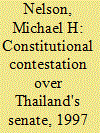

|
|
|
|
|
| Publication |
2014.
|
| Summary/Abstract |
One key component of modern constitutions is the representative system. The often-contested codification of this system over time in democratizing political orders depends on a number of factors, such as the existing institutional setting, the power relations of important political actors, and the ideational resources, or political culture, available to the constitution drafters. This article examines the ideational resources drawn on by the members of Thailand's 2007 Constitution Drafting Committee (CDC) in debating and deciding the shape of the National Assembly's upper house, the Senate. This is mainly done by analysing the word-by-word minutes of the meetings. The respective processes of the 1997 CDC are described more briefly in order to provide background on an area of constitutional contestation that found its latest expression in November 2013, when the Constitutional Court invalidated the National Assembly's constitutional amendment, which would have reintroduced a fully elected Senate. The article contextualizes these developments by reference to mass protests against the "Thaksin regime" that had been organized since November 2013 by the so-called People's Democratic Reform Council (PDRC).
|
|
|
|
|
|
|
|
|
|
|
|
|
|
|
|
| 2 |
ID:
164687
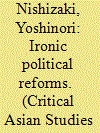

|
|
|
|
|
| Summary/Abstract |
An elected Senate and the party-list system are two institutional innovations of the 1997 Thai Constitution designed to support political reforms. This paper sheds light on one unintended effect of these reforms: they have allowed scores of political families to maintain or even tighten their grip on Parliament. Combining aggregate data and case studies, this paper shows that a sizable number of elected senators and party-list parliamentary members are related, by birth or marriage, to other parliament members elected in the post-1932 period. The well-intended reforms have concentrated parliamentary power in the hands of these families, many of which represent the excesses of Thailand’s full-blown electoral democracy. The survival and resilience of these families diminish reform opportunities by further entrenching corruption, clientelism, violence, and electoral fraud, as well as by deepening dynastic rule that militates against political pluralism and inclusiveness.
|
|
|
|
|
|
|
|
|
|
|
|
|
|
|
|
| 3 |
ID:
155585
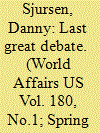

|
|
|
|
|
| Summary/Abstract |
Most U.S. scholarship on the political history of the First Persian Gulf War covers the general debate between the branches of government or among the international community. Several works address the length and quality of the legislature’s deliberation. The few studies examining veteran’s demographics in Congress mostly do so from a macro perspective. None meaningfully scrutinize the personal military service of individual congressmen or how the sheer quantity of veterans in the 102nd Congress influenced the debate. Correcting this oversight, this article shows how politically influential the personal experiences of so many legislators actually were. I argue that the quantity of veterans in the 101st and 102nd U.S. Congresses demonstrably influenced the character and quality of the debate preceding the war in two ways. First, veterans rendered arguments in the context of military experiences and reached conclusions from a veteran’s as much as a legislator’s perspective. Second, their common wartime participation generated a collegial atmosphere of mutual respect and serious deliberation largely free from normal partisan pressure—which stands in stark contrast to contemporary congressional gridlock. In doing so, I show that permeating this discourse and the emotional, yet civil, debate was a powerful source of historical memory.
|
|
|
|
|
|
|
|
|
|
|
|
|
|
|
|
| 4 |
ID:
118995
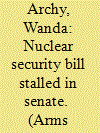

|
|
|
| 5 |
ID:
087698
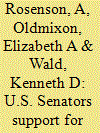

|
|
|
|
|
| Publication |
2009.
|
| Summary/Abstract |
This paper explores Senate policy-making toward Israel from 1993-2002. Previous scholarship suggests that congressional policymaking toward Israel is heavily influenced by the ethnic and religious identification of both legislators and their constituents, not simply by legislators' abstract perceptions of the national interest. Other literature de-emphasizes the likelihood that constituent interests will affect Congressional foreign policy making. We test for an impact of both elite and constituent characteristics on Congressional support for Israel, using sponsorship-cosponsorship decisions in the 103rd-107th Congresses. Israel's strongest supporters in this period are shown to be Jewish, conservative, Republican, and evangelical senators. Notably, elite characteristics (partisanship, ideology, and religion) matter more than constituency factors, with the exception of the Jewish population in senators' home states. While Jewish and conservative senators have long been vocal supporters of Israel, evangelical and Republican senators have not historically taken such a strong pro-Israel stance; hence they are relatively new additions to the active pro-Israel coalition. Thus the pro-Israel coalition shows both continuity and change as it has broadened to include new partners. However, we suggest that this coalition is not necessarily stable and may undergo further evolution in the future.
|
|
|
|
|
|
|
|
|
|
|
|
|
|
|
|
|
|
|
|
|